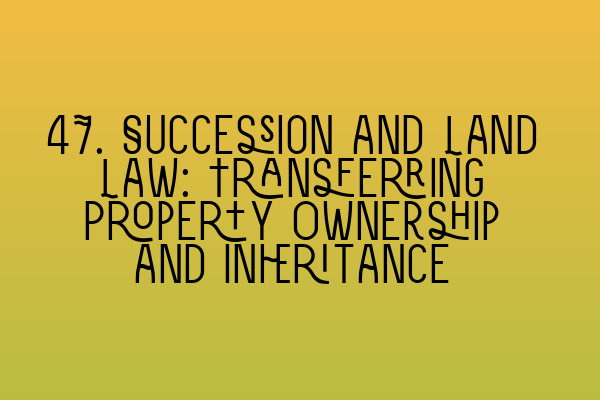47. Succession and Land Law: Transferring Property Ownership and Inheritance
Welcome to another informative blog post from SQE Property Law & Land Law! In this article, we will delve into the fascinating world of succession and land law, specifically focusing on the process of transferring property ownership and inheritance. Whether you are a law student preparing for the SQE 1 or SQE 2 exams, a solicitor needing a refresher, or a curious individual interested in the realm of property law, this article is meant for you.
Understanding Succession Law
Succession law deals with the transfer of property ownership upon the death of an individual. It encompasses various legal principles and procedures that govern the distribution of assets and liabilities, as well as the rights and obligations of heirs and beneficiaries. A comprehensive understanding of succession law is crucial for solicitors practicing in this field.
One important aspect of succession law is the process of obtaining a grant of probate. When a person dies, their assets and liabilities form their estate. To administer the estate, a grant of probate is generally required. This legal document confirms the executor’s authority to distribute the deceased’s assets according to their will. Our related article on SQE 1 Practice Exam Questions provides helpful resources for testing your knowledge in this area.
Another key concept in succession law is the concept of intestacy. If a person dies without a valid will, their estate will be distributed according to the rules of intestacy. These rules outline the order of priority for distributing assets to the deceased’s closest relatives. Solicitors need a firm grasp of these rules to ensure a fair and accurate distribution of assets. If you’re looking for practice mocks to prepare for your SQE 1 exams, our article on SQE 1 Practice Mocks FLK1 FLK2 is a valuable resource.
Transferring Property Ownership
Once the legal requirements of succession have been fulfilled, it’s time to focus on transferring property ownership. This process involves legally transferring the title of a property from one individual to another. Solicitors play a crucial role in facilitating this transfer and ensuring that all legal obligations are met.
The first step in transferring property ownership is to conduct a thorough title search. This involves examining the legal documents and records relating to the property to verify its ownership and any encumbrances such as mortgages or easements. By conducting a title search, solicitors can provide their clients with a clear understanding of the property’s ownership status. If you’re preparing for the SQE 2 exams, make sure to check out our comprehensive SQE 2 Preparation Courses article.
Once the title search is complete, the next step is to prepare the necessary legal documents for the transfer of ownership. These documents typically include a transfer deed, which effectively transfers the legal ownership of the property, and a contract for sale, which outlines the terms and conditions of the transfer. Solicitors must ensure that these documents comply with all legal requirements and protect their client’s interests.
It’s important to note that transferring property ownership involves various legal formalities, such as the execution of the transfer deed. The transfer deed must be properly executed in accordance with the law to be legally valid. Solicitors are well-versed in these formalities and can guide their clients through the entire process. For upcoming SQE exam dates, consult our article on SRA SQE Exam Dates for important information.
Inheritance and Tax Implications
When property ownership is transferred as part of the succession process, certain tax implications can arise. Inheritance tax, in particular, is a significant consideration for both the deceased’s estate and the beneficiaries. Solicitors must have a strong understanding of inheritance tax laws to provide accurate advice to their clients.
In the UK, inheritance tax is payable if a deceased person’s estate exceeds a certain threshold. The current threshold is £325,000, and any amount above this threshold is subject to a tax rate. However, certain exemptions and reliefs may apply, such as the spouse exemption or the 7-year gift rule. Solicitors need to consider these exemptions when calculating the inheritance tax liability for their clients.
As solicitors, it is essential to stay up-to-date with the latest changes and developments in inheritance tax law. This knowledge will allow you to provide the best advice and support to your clients, ensuring a smooth transfer of property ownership.
Conclusion
Succession and land law present intricate challenges and opportunities for solicitors. From navigating the intricacies of probate and intestacy to ensuring the seamless transferral of property ownership, solicitors in this field play a vital role in safeguarding their clients’ interests.
If you’re preparing for the SQE 1 or SQE 2 exams, our comprehensive preparation courses can equip you with the knowledge and skills necessary to excel. Don’t forget to check out our related articles on SQE 2 Preparation Courses and SQE 1 Preparation Courses for further resources.
Thank you for reading this blog post from SQE Property Law & Land Law. We hope you found it informative and valuable. Stay tuned for more insightful articles!
